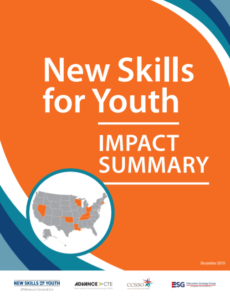Under Kentucky’s new program approval and review process, schools and districts can use state and federal funding to support career pathways only if their programs are aligned with priority industries or top occupations. This is just one of the strategies Kentucky used under the New Skills for Youth (NSFY) initiative to transform and phase out virtually every career pathway that was not well aligned with labor market demand.
From 2016 through 2019, Kentucky and nine other states in the NSFY initiative received $2 million and hands-on technical assistance and coaching to strengthen their career readiness systems. As part of the NSFY initiative, a $75 million national initiative developed by JPMorgan Chase & Co, the Council of Chief State School Officers, Advance CTE and Education Strategy Group worked with states to improve their career readiness systems.
 Through NSFY, Delaware, Kentucky, Louisiana, Massachusetts, Nevada, Ohio, Oklahoma, Rhode Island, Tennessee and Wisconsin took action to:
Through NSFY, Delaware, Kentucky, Louisiana, Massachusetts, Nevada, Ohio, Oklahoma, Rhode Island, Tennessee and Wisconsin took action to:
- Develop and scale high-quality career pathways: Massachusetts designed and launched a new initiative to expand access to high-quality college and career pathways (HQCCPs). HQCCPs include Innovation Pathways, which connect student learning to broadly defined, in-demand industry sectors, and Early College programs, which enable students to earn at least 12 college credits in high school.
- Expand access to work-based learning opportunities: Louisiana piloted the Building Employment Skills for Tomorrow program in Bossier Parish in 2018 to connect learners with disabilities to work-based learning opportunities, equip them with real-world skills through training, and provide mentorship to program participants.
- Strengthen data and accountability to incentivize career readiness: Ohio’s school report cards include a summative score for the Career & Postsecondary Readiness indicator and break down how learners achieved readiness by reporting the percentage of learners that earned industry-recognized credentials, completed dual enrollment, completed a pre-apprenticeship and more.
- Lay the foundation for sustaining career readiness efforts: In 2017, Nevada, with support from the Nevada Department of Education, the governor and the Legislature, enacted six major policies to lay the foundation for a statewide career readiness system.
The impact of these states across the entire initiative is highlighted in the NSFY Impact Snapshots and NSFY Impact Summary, which examines the state role in catalyzing and transforming career readiness opportunities for youth.
Through NSFY, 10 states demonstrated the importance of strong state leadership to advance career readiness by setting a clear vision and agenda, catalyzing and scaling pathways and work-based learning, and ensuring access and equity in career readiness opportunities. As a result, the impact of the states was far-reaching. For instance, under NSFY Delaware was able to develop 19 career pathway programs in high-demand occupations and Tennessee was able to ensure that 100 percent of high school students have access to at least four early postsecondary courses.
To learn more about the work states completed under the NSFY initiative, register for Advance CTE’s A Look Back at States’ Impact through the New Skills for Youth Initiative webinar, which will take place on December 12 from 1-2 p.m. EST, and download the NSFY Impact Snapshots here.
Brianna McCain, Policy Associate
Tags: career pathways, Data and Accountability, Delaware, Kentucky, Louisiana, Massachusetts, Nevada, New Skills for Youth, NSFY, Ohio, Oklahoma, rhode island, sustainability, tennessee, wisconsin, work-based learning

